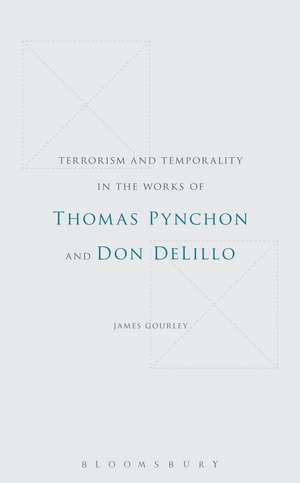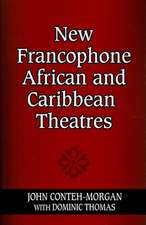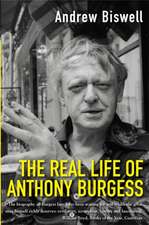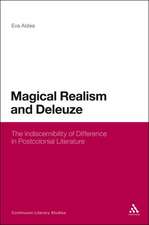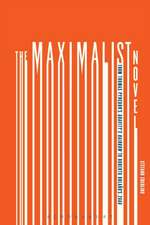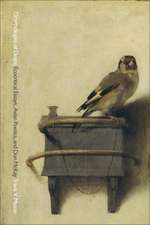Terrorism and Temporality in the Works of Thomas Pynchon and Don DeLillo
Autor Dr. James Gourleyen Limba Engleză Paperback – 17 dec 2014
| Toate formatele și edițiile | Preț | Express |
|---|---|---|
| Paperback (1) | 255.66 lei 6-8 săpt. | |
| Bloomsbury Publishing – 17 dec 2014 | 255.66 lei 6-8 săpt. | |
| Hardback (1) | 771.75 lei 6-8 săpt. | |
| Bloomsbury Publishing – 31 iul 2013 | 771.75 lei 6-8 săpt. |
Preț: 255.66 lei
Nou
Puncte Express: 383
Preț estimativ în valută:
48.93€ • 50.89$ • 40.39£
48.93€ • 50.89$ • 40.39£
Carte tipărită la comandă
Livrare economică 14-28 aprilie
Preluare comenzi: 021 569.72.76
Specificații
ISBN-13: 9781628928051
ISBN-10: 1628928050
Pagini: 200
Dimensiuni: 152 x 229 x 11 mm
Greutate: 0.27 kg
Editura: Bloomsbury Publishing
Colecția Bloomsbury Academic
Locul publicării:New York, United States
ISBN-10: 1628928050
Pagini: 200
Dimensiuni: 152 x 229 x 11 mm
Greutate: 0.27 kg
Editura: Bloomsbury Publishing
Colecția Bloomsbury Academic
Locul publicării:New York, United States
Caracteristici
Addresses theoretical conceptions of time, an area re-emerging in philosophical and theoretical discourse
Notă biografică
James Gourley is a Lecturer in the School of Humanities and Communication Arts and member of the Writing and Society Research Centre, University of Western Sydney, Australia
Cuprins
Introduction1. Mao II: Pre-Figurations of Terrorist Temporality2. The Futurity of the 10th of September 3. Beckett's Proust and Falling Man4. Intimate Time: The Limits of Temporality in Point Omega5. Pre-Cursors to Pynchon's Reconsideration of Temporality in Gravity's Rainbow6. The Duration of Thomas Pynchon's Hell7. Pynchon's Futurist Manifesto8. Inherent Vice and the Chronotope ConclusionWorks CitedIndex
Recenzii
Gourley has made an important contribution to our understanding of the work of two of the most important and most demanding of contemporary American novelists... Tracing some of the influences on these two writers, including Marinetti, Beckett and Proust, and drawing on relevant theoretical arguments, Gourley offers a fresh and illuminating account of their fiction before and after the attack.
In this remarkable book, James Gourley argues that the 9/11 terrorist attacks threw down a series of challenges: to the perceived position of the United States in the world, to our understanding of time and temporality, and to the notion of art in general and the novel in particular as an adequate and appropriate register of reality. Gourley shows how his two chosen authors, Don DeLillo and Thomas Pynchon, responded to these challenges in related but also significantly different ways. He reveals the continuities between their work written before and then after 9/11 and also the radical changes the terrorist attacks effectively compelled. Above all, he shows just how the trauma of 11th of September 2001 made these two writers reassess their work and their field and devise a new template for literature. Theoretically informed and critically astute, Terrorism and Temporality in the Works of Thomas Pynchon and Don DeLillo represents a significant addition to the growing field of 9/11studies. It is indispensable reading for anyone interested in that field or in the work of these two major American authors-or, for that matter, in the larger issue of the relationship between politics and aesthetics, historical crisis and literary form. It also offers invaluable insights into the enigma of authorship, just how writers manage to speak the unspeakable.
The second plane hovers like Zeno's Arrow before impact with the South Tower, and time changes. In Terrorism and Temporality in the Works of Thomas Pynchon and Don DeLillo, James Gourley tracks the shift from cyber-capital's measurement of time in nanoseconds to the convergence of temporality in the Omega Point. Pynchon and DeLillo are our two most time-sensitive novelists, and Gourley deftly shows how their world, and ours, is changed utterly by the events of 9/11.
In this remarkable book, James Gourley argues that the 9/11 terrorist attacks threw down a series of challenges: to the perceived position of the United States in the world, to our understanding of time and temporality, and to the notion of art in general and the novel in particular as an adequate and appropriate register of reality. Gourley shows how his two chosen authors, Don DeLillo and Thomas Pynchon, responded to these challenges in related but also significantly different ways. He reveals the continuities between their work written before and then after 9/11 and also the radical changes the terrorist attacks effectively compelled. Above all, he shows just how the trauma of 11th of September 2001 made these two writers reassess their work and their field and devise a new template for literature. Theoretically informed and critically astute, Terrorism and Temporality in the Works of Thomas Pynchon and Don DeLillo represents a significant addition to the growing field of 9/11studies. It is indispensable reading for anyone interested in that field or in the work of these two major American authors-or, for that matter, in the larger issue of the relationship between politics and aesthetics, historical crisis and literary form. It also offers invaluable insights into the enigma of authorship, just how writers manage to speak the unspeakable.
The second plane hovers like Zeno's Arrow before impact with the South Tower, and time changes. In Terrorism and Temporality in the Works of Thomas Pynchon and Don DeLillo, James Gourley tracks the shift from cyber-capital's measurement of time in nanoseconds to the convergence of temporality in the Omega Point. Pynchon and DeLillo are our two most time-sensitive novelists, and Gourley deftly shows how their world, and ours, is changed utterly by the events of 9/11.
